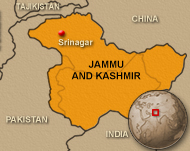Kashmir bus triggers business boom
The historic bus service that plies the road across divided Kashmir is proving a boon for businesses on the Pakistan side of the militarised border.

Petrol stations, hotels, shops and houses have sprouted up since the bus began operating in April, opening a land link across the Line of Control between the Indian and Pakistan portions of the Himalayan region.
The service is limited, but it has had a powerful impact by reuniting divided families. It has also boosted Kashmiris’ confidence in the peace process between South Asia’s neighbours and made them more willing to invest in the economy.
“The start of the bus service has ended our perpetual fears of cross-border shelling,” said Bashir Ahmed in Chakothi. His small grocery store lies a few doors down from a school ruined by Indian artillery fire in 2002.
Hopeful
“Now I am hopeful that peace will last in the area,” said the father of six.
Since the bus service began, Bashir said he has doubled his investment in his shop – selling groceries and footwear – as sales have risen.
Nearby, Munir Hussain Shah, 36, who recently set up a shop selling kulcha, a type of wheat biscuit, reported he was also doing brisk business.
|
“Now I am hopeful that peace will last in the area” Bashir Ahmed, |
“No one would think about opening a business in Chakothi when the town was being shelled,” he said. “Now I have no spare time from my business. I’m selling 5000 kulcha every day.”
Front line
For years, residents of Chakothi were on the front line of border fire, virtually living under siege. Much of the town still bears the scars of the shelling, which only halted in November 2003 when the two sides agreed to a ceasefire.
Now the bazaar is bustling, and along the 60km road that skirts the rushing Jhelum river to the provincial capital, Muzaffarabad, there are signs of increased commerce in every town and village.
Locals are moving more freely since the cessation of hostilities at the border, and the numbers of tourists from the rest of Pakistan to the scenic province have increased.
The fortnightly bus, which travels to Srinagar, the capital of Indian-administered Kashmir, also attracts visitors.
Al-Haj Muhammad Ashraf Qureshi, chairman of the regional Traders’ Action Committee, said there had been a 20% increase in business along the route since the bus started.
More business
“There would be a 100% increase if five or six buses run daily from Muzaffarabad and Srinagar,” he said.
Pakistan and India are still a long way from resolving their dispute over Kashmir, a mountainous region claimed by both and the cause of two of their three wars since receiving independence from Britain in 1947.
 |
|
Kashmir has been divided for |
But the passenger bus and India’s decision to allow a visit to Pakistan this month by a delegation of Kashmiri separatist leaders for the first time in 57 years are seen as signs that they are now serious about peace.
The two governments also plan to increase the frequency of the buses and allow trucks carrying goods to travel the same route.
Malik Muhammad Imtaiz, 30, said he had set up a shop on the road two months ago, hoping that he could soon trade in goods imported from the Indian side – such as fruit, vegetables and spices – when the truck service starts.
Expenses
He said produce was cheaper in India, and travel costs would be less from Srinagar – 118km from Chakothi – than from his current suppliers in the Pakistani city of Rawalpindi, 200km away.
Pakistani officials say that a delegation of Indian traders will visit Muzaffarabad by the end of the June.
Obstacles, however, remain to a further softening of the border, still patrolled by thousands of Pakistani and Indian forces.
Some Islamic separatist groups fighting on the Indian side of the border oppose the bus and have threatened to sabotage it. The insurgency continues to claim lives almost daily.